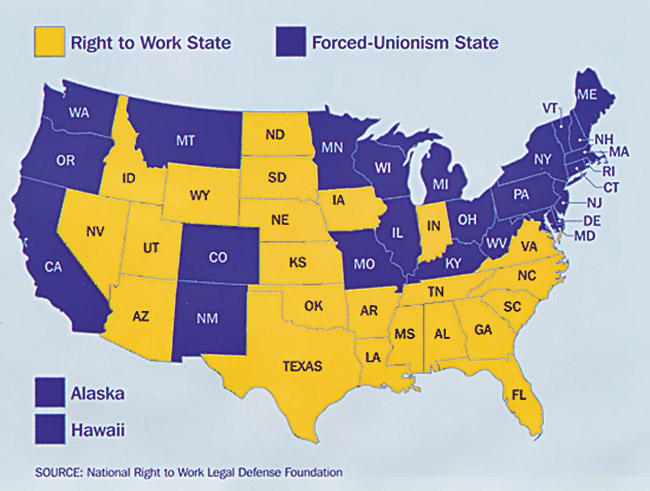Unions Losing Out To Right To Work

Add Wisconsin to the states above that now have right-to-work laws
GRAPHIC FROM NATIONAL RIGHT TO WORK LEGAL DEFENSE FOUNDATION
It ain’t easy being both pro-union and pro-right-to-work law, but I manage. The key is being for the right of workers who want a union to have one through a secret ballot, and the right of those who wish to opt out to do that without having to pay dues or a special fee.
Free association is important. Twenty-five states permit you to work without mandatorily joining a union, or paying dues or fees. Here, you must belong to hold most state or city jobs.
Members of churches that do not believe in joining unions do not have to. But they usually have to pay the same amount as union dues to a nonreligious, non-union-related charity.
AFL-CIO says, “Extremist groups, right-wing politicians and their corporate backers want to weaken the power of workers and their unions through right-to-work laws.”
Employers counter that neither federal nor state governments should be taking sides by coercing workers through laws to be members of unions.
National Right To Work Committee has been lobbying unsuccessfully for many years for a change in federal law. It would repeal five provisions in the National Labor Relations Act and one in the Railway Labor Act that authorize the firing of workers for refusal to pay union dues or fees to unions in their workplaces.
I generally support that, so long as non-union workers cannot automatically claim the wages, benefits and work rules negotiated by a union for its workplace members. You’d be on your own, basically an individually contracted employee but with all the normal protections currently in federal and state labor laws.
Would such a law change doom unions? No, because most employees would prefer to have negotiating numbers on their side rather than take on an employer one-on-one.
But in Hawaii, with our union public-employee vacation and sick-leave contracts, a worker might be able to trade some of that for salary hikes, better health care, childhood education or other benefits that suit him best.
Not that I see any of that happening here. We’re a union state with a union-friendly Legislature and governors. Have been since the 1946 sugar strike and the great dock strike of 1949.
I’m dismayed each time I read that in this expensive state we have a $7.75 minimum wage. California is $9, Oregon $9.25, Washington State $9.47 and D.C. $9.50.
You can’t survive here on $7.75 an hour.
A recent Star-Advertiser online poll showed heavy support for the benefits of B&Bs. I voted “yes,” but would have said only where the operator lives on premises. None of that renting-out-your-house stuff.
If the noise is kept down and only a couple of cars are added to the street parking, I can’t see the harm.
Those unconstrained vacation rentals are what have soured us.
BanyanTreeHouse@gmail.com





